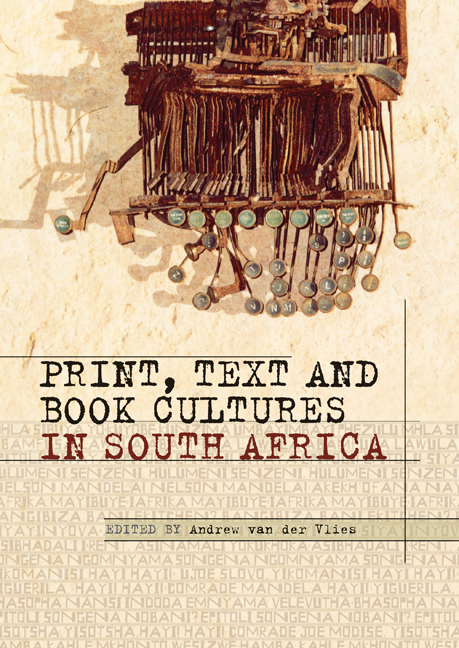Book contents
- Frontmatter
- Contents
- Acknowledgements
- Abbreviations and acronyms
- 1 Introductory
- 2 Print Cultures and Colonial Public Spheres
- 3 Local/Global: South African Writing and Global Imaginaries
- 4 Three Ways of Looking at Coetzee
- 4.1 In (or From) the Heart of the Country: Local and Global Lives of Coetzee's Anti-pastoral
- 4.2 Under Local Eyes: The South African Publishing Context of J. M. Coetzee's Foe
- 4.3 Limber: The Flexibilities of Post-Nobel Coetzee
- 5 Questions of the Archive and the Uses of Books
- 6 Orature, Image, Text
- 7 Ideological Exigencies and the Fates of Books
- 8 New Directions
- Contributors
- Index
4.1 In (or From) the Heart of the Country: Local and Global Lives of Coetzee's Anti-pastoral
from 4 - Three Ways of Looking at Coetzee
Published online by Cambridge University Press: 21 April 2018
- Frontmatter
- Contents
- Acknowledgements
- Abbreviations and acronyms
- 1 Introductory
- 2 Print Cultures and Colonial Public Spheres
- 3 Local/Global: South African Writing and Global Imaginaries
- 4 Three Ways of Looking at Coetzee
- 4.1 In (or From) the Heart of the Country: Local and Global Lives of Coetzee's Anti-pastoral
- 4.2 Under Local Eyes: The South African Publishing Context of J. M. Coetzee's Foe
- 4.3 Limber: The Flexibilities of Post-Nobel Coetzee
- 5 Questions of the Archive and the Uses of Books
- 6 Orature, Image, Text
- 7 Ideological Exigencies and the Fates of Books
- 8 New Directions
- Contributors
- Index
Summary
J. M. Coetzee has repeatedly and self-consciously put under erasure the category—indeed, the very possibility—of a South African “national” literature. In 1978 he declared himself “suspicious of lines of division between a European context and a South African context”, pointing out that the country's “literary products” were routinely “flown to the metropolitan centre and re-exported to us from there at a vastly increased price”. This, he suggested, “should give people pause before they start talking about a South African literature” (Coetzee in Watson 1978, 24, quoted in Watson 1986, 370). He reiterated his suspicions in 1983, wondering whether it was merely a “vast and wholly ideological superstructure constituted by publishing, reviewing and criticism” that had, rather unjustly, forced upon him “the fate of being a ‘South African novelist” (Morphet 1987, 460). Whether such a person was possible was to be questioned, he wrote in an essay in Leadership magazine in the same year, because “South Africa” was itself a difficult idea:
In what sense is South Africa a single society, to what degree merely an agglomeration of people within a more or less unitary economic organization, belonging in part to a single mass culture, for the rest involved in one or other moribund ethnic (African, Afrikaans) or anachronistic provincial (English) culture, held together in various degrees of unwillingness by laws imposed from above? (Coetzee 1983, 77).
And in 1981, when accepting his second CNA Prize (for Waiting for the Barbarians), South Africa's premier literary award at the time, sponsored by the country's leading newsagent and stationer, he questioned whether there could be “a good motive for thinking of” writing produced in English in Africa as part of any “national” literature; anyone describing it thus might be suspected of “the political motive of wishing to span in the energies of writers for national ends” (Coetzee 1981).
- Type
- Chapter
- Information
- Print, Text and Book Cultures in South Africa , pp. 166 - 194Publisher: Wits University PressPrint publication year: 2012



